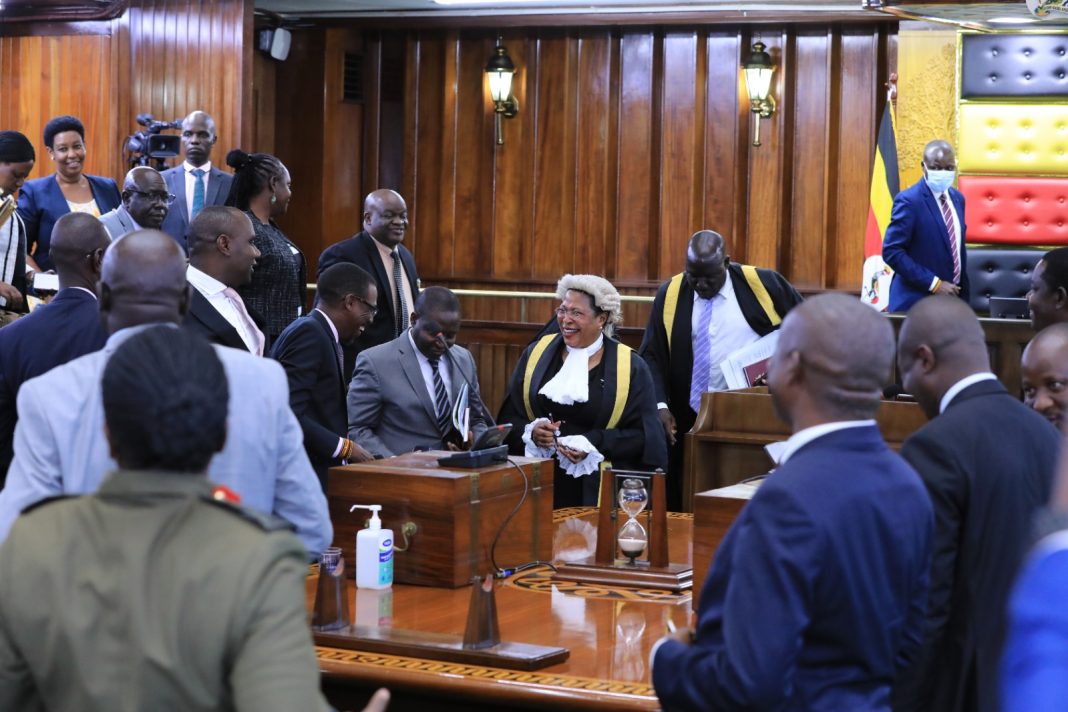Parliament has enacted the Supplementary Appropriation Bill, 2025, authorizing additional government expenditure amounting to Shs4.86 trillion to address urgent and unanticipated financial requirements beyond the initially approved budget for the 2023/2024 fiscal year.
This resolution was adopted during a plenary session held on Thursday, 15 May 2025, presided over by Speaker Anita Among.
Presenting the Budget Committee’s report to the House, Deputy Chairperson Hon. Remigio Achia explained that the supplementary funding aims to cover costs that were not foreseeable at the time the main budget was passed.
The appropriation aligns with the provisions of the Constitution and the Public Finance Management Act.
The funds, which had already been disbursed under three supplementary schedules during FY 2023/24, were formalized through this legislation, covering both operational and development-related expenditures.
According to the Bill, government ministries were allocated a total of Shs1.39 trillion. Notably, the Office of the President received Shs396 billion, State House was granted Shs189 billion, and the Ministry of Internal Affairs obtained Shs204 billion.
The Ministry of Finance, Planning and Economic Development was granted Shs88.8 billion; the Ministry of Health received Shs38.6 billion, while Shs47.3 billion was allocated to the Ministry of Works and Transport. Additionally, the Ministry of Gender, Labour and Social Development was assigned Shs73.3 billion, among others.
An extra Shs1.21 trillion was distributed to statutory bodies and public institutions. The Secretariat for Science, Technology and Innovation received the highest allocation at Shs757 billion, followed by the National Animal Genetic Resource Centre with Shs92 billion. The Uganda Bureau of Statistics received Shs83.1 billion, National Identification and Registration Authority (NIRA) was allocated Shs4.2 billion, and Makerere University got Shs14.5 billion.
Other institutions that benefited included the Uganda Cancer Institute, Uganda Blood Transfusion Services, Uganda Land Commission, Uganda Industrial Research Institute, Uganda Police Force, Uganda Prisons Service, and regional referral hospitals like Arua, Masaka, and Naguru.
Uganda’s foreign embassies and missions were allocated Shs836.5 billion to fund staff remuneration and operational costs in over 50 diplomatic missions.
Meanwhile, local governments including districts, municipalities, and cities—were allocated Shs2.46 trillion to cover salary gaps, conditional and unconditional grants, and equalization funds to enhance service delivery at the grassroots level.
Hon. Achia underscored that all the expenditures remained within the legally permissible threshold of 3 per cent of the total budget, as stipulated in the Public Finance Management Act, and complied with earlier parliamentary resolutions.
“In conclusion, the Committee proposes that the Supplementary Appropriation Bill, 2025 be enacted into law,” he stated, prompting unanimous approval by the House. The Act will apply retroactively from 1st July 2023.
However, Hon. Ibrahim Ssemujju (FDC, Kira Municipality) urged for a more deliberate and less hurried approach to the budgeting process.























